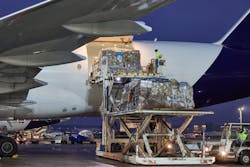Supported by a large-scale advance cargo information system, the European Union (EU) is implementing a new customs pre-arrival security and safety program called Import Control System 2 (ICS2). The program is a contributor towards establishing an integrated EU approach to reinforce customs risk management under the common risk management framework (CRMF).
Release 1 and Release 2 of ICS2, which both affect air carriers, became effective as of March 15, 2021, and March 1, 2023, respectively.
With the implementations, ICS2 has multiple implications on the air cargo market.
What is ICS2?
ICS2 is an EU-wide, integrated system for the pre-loading reporting of all import and transit air cargo and airmail shipments.
“We have to transmit relevant shipment data to customs prior to loading and to transport shipments only after receiving clearance from customs authorities. Shipments that could endanger flight safety and security are identified early on through this new ‘pre-loading reporting’ and sorted out before they are loaded onto an aircraft bound for the EU,” affirms Jan-Wilhelm Breithaupt, vice president of global fulfilment at Lufthansa Cargo.
As of March 1, 2023, new requirements apply to general carriers – essentially all passenger aircraft that also carry cargo, explains Arnoud Wink, manager of border control and regulatory affairs at KLM Cargo.
“They have an obligation to pre-load advance cargo information (PLACI) to be filed with the customs authorities of the EU. This is part of the ICS2, the new system of the European customs, which assesses whether the cargo complies with the safety and security requirements of the EU. ICS2 will ultimately be gradually applicable to all modes of transportation,” he says. “While pre-loading is more of a marketing term, pre-acceptance is a more accurate description in order to avoid the airline taking responsibility for a shipment that is not allowed to be transported to the EU.”
Use of Data
Data must be available before the cargo is accepted and after the carrier has filed with the shared trader interface. This data is reusable for the declaration upon importation and the statement for the temporary storage regulation by the handler, according to Wink.
“Once the shipment data has been reviewed by the authorities, the carrier receives an assessment complete message. So, where does the benefit lie for a carrier?” he says. “In principle, the air cargo world is well-regulated and there is an industry standard, the master operating plan, which outlines the air cargo supply chain. However, due to various reasons, the data for a cargo shipment is not always timely or complete. The expectation is that this will change for the simple reason that a shipment that does not receive approval from the customs authorities in the EU will simply not be accepted.”
In order to understand more completely, an analogy can be drawn with passenger transport, explains Wink.
“Indeed, one can book a ticket, but one is only truly accepted after the passport has been checked for validity, the presence of visas, and so on,” he says.
The changes for the EU essentially point to the fact that if one has the data, one must do something with it, according to Wink.
“The EU regulation also stipulates that the harmonized system code (HS code) of the goods to be transported must be included on every air waybill. Generic goods descriptions like general cargo or spare parts thus belong to the past. This allows the carrier to determine which goods they can accept for transport, with the HS code helping distinguish goods that are considered military-strategic or dual-use according to EU laws and regulations,” he says.
“This simplifies the check for the presence of the correct (transit) permits,” Wink continues. “All in all, the implementation of ICS2 is a complex change. It requires adjustments to systems, as well as rewriting and re-communicating processes and procedures to partners in the supply chain. One advantage is that the quality and timeliness of declarations will greatly improve, and it enables the carrier to easily perform checks on permit-required shipments.
“In my opinion, ICS2 is a blessing in disguise.”
Operating Practices
A new feature under ICS2 is that customs can impose further actions for their risk assessment, the so-called referral, highlights Breithaupt.
“As consequence, additional information on the shipment may be requested or additional high-risk screening may be ordered. Should the authorities be certain that they have identified a hazard on the basis of the data, a transport stop ('do not load') for this shipment will be issued,” he says. “In order to reduce the impact for our Lufthansa Cargo worldwide stations and ground handling agents, in case of a referral, a central team will coordinate the communication between affected stations/ground handling agents and customs authorities.”
By communicating the Air France-KLM policy to their clients, including forwarders, it is ensured that cargo is accepted only after all necessary information has been provided and a confirmation of assessment has been received, affirms Wink.
“We proceed with accepting the shipment once these conditions are met. During this procedure, if a situation arises where a shipment must be removed, the potential for unloading the entire pallet is evident due to departure time limitations. Subsequently, our ground handler ends up with a shipment in the warehouse that has not been authorized for transportation into or through the EU,” he explains.
Compliance with regulatory requirements is a top priority, thus, the implementation of the new European customs requirements to increase aviation safety and security is an operational necessity and of considerable relevance to cargo operators, according to Breithaupt.
“I am pleased that we are one of the first EU carriers to have completed the necessary ICS2 adjustments to the relevant information technology (IT) systems and processes and that we can offer added value to our customers by providing them with advice and support in their preparations,” he says.
As far as ICS2 is concerned, foreign operators must follow the same rules as EU operators.
“There are plenty of similar regimes around the world and any operator/carrier can choose to file directly or through so called service providers,” concludes Wink.






